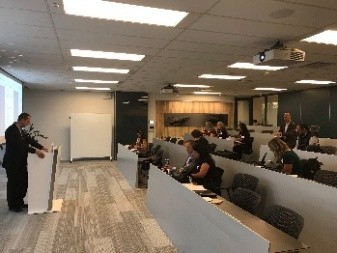
October 2019
PJVA Luncheon September 12, 2019 SummaryPJVA Annual General Meeting rescheduled
PJVA November 14, 2019 Luncheon
JV Certificate Program Volunteers required!
Who's On Board?
Brad Wall: Recent Court Decision on TMX – Actually Positive
Various factors influencing the Canadian Oil & Gas industry
PJVA Upcoming Courses – PSSA, Product Measurement, JV Agreements, JP05
21st Annual Holiday Social
PJVA Luncheon September 12, 2019
For the September luncheon, we set out to explore the development of Energy Security in Canada, Federal-Provincial collaboration and the Energy Corridor concept. PJVA assembled a panel discussion of the issues with speakers:
- Dale Nally, Alberta Associate Minister of Natural Gas;
- Kevin Birn – Vice President, North American Crude Oil Markets, IHS Markit;
- G. Kent Fellows, Research Associate at U of C’s School of Public Policy;
- and with a Federal perspective, Greg McLean, previous advisor to two Federal Cabinet Ministers - Harvie Andre, M.P. for Calgary Centre and Jean Corbeil, Minister of Transport and principal at Criterium Merchant Capital.
Minister Nally led the panel referring to the 2018 report by the Natural Gas Advisory Panel Report to the Minister, titled “Roadmap to Recovery: Reviving Alberta's Natural Gas Industry” which is often referred to as the NGAP report.
Minister Nally reported on what the provincial govt has achieved since inception including placing priorities on pipelines and market access, contesting Bills C-69 & C-48, scrapping the provincial carbon tax, reducing Alberta’s corporate tax rate to make it the most attractive jurisdiction across Canada which in a few years will place Alberta among the lowest jurisdictions in North America- tied with Texas.
Greg McLean spoke to the realities of surging US natural gas development, especially LNG development compared to little or no development in Canada. He detailed what has held up Canadian development. While the US has a constructive regulatory regime, designed to facilitate new project construction - Canada’s regulatory process takes much longer. Greg advocated the Energy Corridor to reduce the cost of the environmental assessments that happen for every project. Finding that path for Canadian resources and utilities to marketplaces is a key area to be developed. He noted a goal of Energy independence by 2030 is attainable.
Kevin Birn's observations were that the WCSB space has changed considerably over the past half-decade. The surge of light sweet crude oil in the united states provided the world a new sense of energy security and the world has moved into a period of energy abundance. While pipeline capacity has managed to grow, it still has been unable to keep up with demand as major pipeline projects have continued to meet delay. Western Canada upstream activity continues to decelerate and there is a lack of confidence over the timing of future pipeline capacity and ultimately the price of oil that continues to weight on upstream investment.
G. Kent Fellows discussed what an Energy or Intermodal corridor would actually be in the context of his research work. He envisioned the corridor as a network of multi-modal rights of way that will facilitate private investment in transportation modes by clearing regulatory "underbrush". The long-term success of the corridor would be in shifting focus from Canada’s current North-South Trade with the US to a focus on East-West and West-East inter-provincial and global trade. He pointed out the US is our biggest trading partner, which isn't going to change soon, but global development patterns increasingly indicate a huge potential for incremental new trade that is much stronger east-west than north-south.
PJVA thanks all the speakers and all attendees that made this luncheon a success.
Maureen McCall
PJVA Director- Programs-Luncheons
PJVA Annual General Meeting
Tuesday, September 17, 2019
1600, 215 – 2nd Street SW
7:30 am - 9:00 am
This year's AGM is took place on September 17th at Petronas Energy Canada's office.
 Hosted by the new PJVA President, Grant Feddema, there was a variety of feedback from the members who attended.
Hosted by the new PJVA President, Grant Feddema, there was a variety of feedback from the members who attended.
Kody Carroll, PJVA Treasurer, gave a summary of the PJVA’s financial performance. Whereas the PJVA made a loss last year, cash flow is now positive, and searching for sponsorship and promoting the PJVA brand is still ongoing.
Attendees were insufficient for a quorum (less than 30), therefore many of the votes could not proceed. As a result the voting will take place prior to the November 14, 2019 luncheon at 11:00 am.
The annual report is now available on the website here, so that all members can be fully informed of every aspect of PJVA’s current operations and future plans.
Peter Mitchelmore
PJVA Newsletter Editor
PJVA November 14, 2019 Luncheon
Chris Slubicki, President & CEO of Modern Resources - "PLAN B – A Discussion of Forward Solutions for the Canadian Energy Industry”
Discussions regarding energy and the environment in Canada have become increasingly heated and divisive. Canada, meanwhile, is failing to reduce greenhouse gas emissions despite policies and court decisions that have caused significant damage to our world-leading energy industry. Time to explore some of the serious unintended consequences of our current regulatory environment and find a new path forward to economic prosperity, environmental sustainability and a more cohesive Canada. How do we invite other provinces back into the conversation? What role can complimentary resources play? What makes more sense for carbon reduction - Paris targets vs. Zero Carbon concepts? How do we handle the disparity between Canadian emissions vs. World emissions and what we can do differently.
JV Certificate Program Volunteers required!
Volunteers are required for the JV Certificate Program as follows:
These are longer term commitments – ideally, you will be ready to stay in the role for 1 or more years.
Time commitment: 2 – 5 hours/month, varying based on work required and number of committee members available
Experience required:
- 2+ years' experience with completion of the JV Administration or JV Analyst Certificate Program; OR
- 5+ years' experience in a JV Administrator or JV Analyst role
Ideal candidates for these roles exhibit some or all of the following skills:
- Able to work in a confidential manner;
- Have current, relevant, industry experience and an understanding of the current PJVA Model agreements in use;
- The ability to identify, research and summarize information from various sources;
- Able to write new material, or edit existing materials, in a clear and concise manner suitable for use as an educational resource.
ALL interested PJVA members are welcomed to submit their names to Randy Tomilson (randytomilson@shaw.ca) for any of these roles – your unique combination of experience, background, and skills might be exactly what is needed for the ongoing development and maintenance of our course materials.
Who's On Board?
 Jaime Botero
Jaime Botero
Co-Director Membership and Volunteering
Tell us about yourself:
I started my career in the oil and gas industry in 2004 at Chevron, where I worked in Downstream at their Credit and Receivables Management Department. Over the years, I have worked for various other Midstream and Upstream Oil and Gas companies, on various Accounting and Joint Ventures roles, my current position is at Repsol, where I am currently a Joint Ventures Business Analyst. I hold a Bachelor of Business Administration with a minor in Management, a Diploma in Corporate Finances with a minor in Management, and the CAPPA, CSC and PJVA Administration and Analyst Certificates.
Joint Venture have been my passion for many years, so then I decided to join the PJVA Board of Directors in 2019, as co-Director of Membership and Volunteering.
When did you get involved on the PJVA Board and why?
2019, because I would like to give back to the field that has given me so much, Joint Ventures in the Oil and Gas industry, by volunteering my time and sharing my knowledge and experience as best as I can.
Tell us about why you like the challenges of the joint venture business?
I like managing relationships in a constructive way and getting the parties to agree on win/win situations. I believe in the creation and maintenance of long term relationships and on the fair way of dispute resolution.
Tell us about the Membership and Volunteering portfolio you’re responsible for at PJVA and the goals you have set for the next year or two?
I am new to this portfolio this year, my two main goals for this and next year are to procure the recruitment of active members as volunteers for the various Committees as required by the other Board Members, and to find ways to attract new members so we keep on growing our Association.
Best advice you ever received?
Persevere until you get what you are looking for.
Brad Wall: Recent Court Decision on TMX – Actually Positive
*Article published by EnergyNow, September 23, 2019, and written by Brad Wall, September 20.
Bias confirmation. We’ve all experienced it. Like when we buy a new vehicle, a make and model we haven’t really noticed or favoured before. In fact, in the back of our mind, while we were doing the sales dance in the showroom, the doubts keep creeping in. Why have I never seen any of these out in the street? Why am I thinking about being the first one in the history of ever to buy this vehicle? And then we drive away from the dealership and our doubts are relieved because this make and model of vehicle is, in fact, everywhere!
It turns out many people have also bought that very vehicle. So many. And we feel better.
Of course, there are no more of them than before we walked onto the dealership lot. We just never noticed them before we bought one. This is all a form a confirmation bias. Seeing things through the lens of our own bias. In this example, a very recently and expensively acquired bias.
Then too we carry our own bias to the oil and gas news and pipelines news we consume. It’s hard to be too critical of the fact that western Canadians who understand the importance of the oil and gas business to our collective and individual quality of life have a negative bias when it comes to sector news we read or watch or hear. We seem to always be prepared for the worst.
The recent court rulings on TMX evinced a negative reaction from many in the sector. The top line reporting of those rulings confirmed a negative bias: that no pipelines will ever get built again…ever.
But here's why these two recent rulings might actually be a reason for hope.
In the case of the federal court of appeal ruling a few weeks ago on 12 motions to intervene against TMX.
6 of the 12 motions were defeated including 2 of them from First Nations. Unprecedented.
Other intervenor motions denied came from Youth Climate Strikers, BC Nature, Raincoast and the City of Vancouver (you may want to consider their application to intervene when planning to spend your tourism dollars).
In the previous round on TMX every intervenor motion was allowed with no explanation from the court. In the Northern Gateway round the same was true.
So this was a marked changed in a court ruling on a pipeline approval process. In fact, I’ve heard concerns the ruling was ‘too good’ and that an application for a leave to appeal to the Supreme Court might benefit from a concern as to how far this ruling moved the pendulum.
Then there is this week’s ruling from the British Columbia Court of Appeal – another win for TM that in some quarters has been mischaracterized as a setback. The Court of Appeal heard appeals from Vancouver and the Squamish FN in which the main appeal claim was:
BC approved the TM Pipeline based on the NEB Report. The NEB Report was sent back to the NEB for Reconsideration. So, the Provincial approval (the “EAC”) should be quashed and the whole process must restart at ground zero.
The BCCA rejected this argument entirely, instead holding that the EAC stands – it is alive and well which means that TM can continue to construct. But, if the BC government believes that the conditions that attach to the EAC should be revised because of the NEB reconsideration, then it should revise them. Importantly, the Court was very clear that any such revision must fall squarely within BC’s very limited (if any) jurisdiction over federal pipelines. The Court helpfully added: “BC cannot prevent or impede construction or operation of the pipeline” and “cannot order assessments that the NEB refused to order”.
It’s understandable that many were quick to leap on what on the face of these rulings seem to confirm our negative bias. On these occasions however it is even more important to remain open to the positive even if it’s not in the top line report or the tweets we read. There is much in these rulings that commend a positive reaction; some reason for hope. Rational hope in Canada’s oil and gas sector is essential just now.
The sector needs it, Calgary needs it, Alberta, my province needs it, and Canada needs it.
Brad Wall
Special Advisory
Osler, Hoskin and Harcourt LLP
Brad Wall served as the 14th Premier of Saskatchewan from 2007 to 2018
*The newsletter may contain material sourced from to third party websites. The material is provided solely as a convenience to you and not as an endorsement by PJVA of the contents on such third party Websites. PJVA is not responsible for the content of third party sourced material and does not make any representations regarding the content or accuracy of materials on such third party Websites, or the availability of such Websites. If you decide to access third party Websites, you do so at your own risk.
Various factors influencing the Canadian Oil & Gas industry
*Summary of items affecting the Canadian oil and gas industry from a variety of media sources, mainly read via EnergyNow.
Globally, the status quo of the oil and gas industry has changed significantly after recent attacks in Saudi Arabia. Having stopped production, prices rose the most it had in eight months. Having restarted production, the price dropped slightly. Reports regarding the speed of Saudi recovery have been conflicting, therefore it would appear to be uncertain as to the overall trend of $/bbl in the future.
Domestically, there is some focus on the Canadian oil and gas industry, in particular with the upcoming federal election on October 21.
The most important task of every single individual is to make a fully-informed assessment of the policies of all the parties and ensure that she or he uses the privilege of living in a democratic nation and ensuring that we all participate in the election by voting.
Peter Mitchelmore
PJVA Newsletter Editor
PJVA Upcoming Courses
PSSA – Pad Site Sharing Agreement – jointly hosted with CAPL – November 19, 2019
Industry is increasingly drilling from shared well pads in which wells and facilities are not held in common interests. The PSSA provides the documentation and operating framework to address the wide range of issues inherent in a pad sharing scenario. There is an integration of JV and Land concepts in the PSSA that requires Land personnel to become more familiar with JV concepts and JV personal to become more familiar with Land concepts.
Product Measurement and Allocation Course – December 4, 2019
This course addresses the following questions:
- What is product measurement and allocation?
- Why does product measurement and allocation matter?
- What is measurement difference? What is an acceptable measurement difference?
- What are common problems and pitfalls?
- What legislation applies to measurement and allocation? (ERCB Directive 17 and EPAP; Enhanced Production Audit Program)
- How does the PJVA/CAPPA/PASC model Product Allocation Exhibit address the above issues?
Suggested attendees include Joint Venture Agreement (CO&O) Practitioners, Product Allocation Practitioners, Revenue and Volume Auditors.
JV Agreements – May 19-20, 2020
PJVA has revamped the JV Agreements Seminar with a bigger focus on Ownership and Service Agreements, and the importance of creating and maintaining a proper agreement. Whether you need to create a Gas Handling Agreement or a CO&O, this seminar will introduce you to the many PJVA model agreements and how best to use them!
This two-day introduction level course is designed to provide an overview and basic understanding of the new Construction, Ownership and Operating Agreement, Unitization Agreements, Gas Handling and other agreements. The CAPL Joint Operating Agreement and PASC Accounting Procedure, as they relate to Joint Venture Agreements, will also be presented by knowledgeable members of CAPL and PJVA. To achieve maximum benefit from this seminar a participant should either have had limited prior exposure to joint venture agreements or desire a refresher on current joint venture agreement model forms. Some prior exposure to joint venture operations would be helpful. Most suitable for individuals involved in engineering, land, operations, administration and accounting.
JP05 – June 9, 2020
The JP-05 workshop will cover the following topics:
- How capital and operating fees are determined using JP-05
- Importance of disclosure, collaboration and negotiation
- Case study for negotiation and determination of fees
- Discussion of case studies
- Regulatory issues relating to JP-05
This workshop will be in depth and include actual examples and case studies and will be appropriate for anyone who is in a position that requires more knowledge in the negotiation and calculation of Gas Processing Fees.
21st Annual Holiday Social
November 28, 2019
The Calgary Petroleum Club
4:30 pm to 7:30 pm
Complimentary to Members

Upcoming Events
JV Certificate Program - Administration Course
October 22 - November 21, 2019
Luncheon & AGM - Chris Slubicki
November 14, 2019
PJVA/CAPL - Pad Site Sharing Agreement Seminar
November 19, 2019
